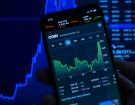Everything for  Business
Business
 Business
Business
 Business
Business
SoftBank will unveil its first major investment since Saudi Arabia invited international scorn for the murder of a journalist.

View Inc. glass in an apartment building lobby. Source: View Inc.
SoftBank will unveil its first major investment since Saudi Arabia invited international scorn for the murder of a journalist.
Despite the recent assassination of a journalist by Saudi Arabian agents and an ensuing global controversy, Masayoshi Son and his Saudi-backed SoftBank Vision Fund appear as bold and extravagant as ever. On Friday, the investment firm plans to announce it has sunk $1.1 billion into View Inc., a Silicon Valley-based maker of glass used in internet-connected windowpanes.
View’s technology allows customers to control the level of tinting in so-called smart windows. This sort of “dynamic glass” can help lower cooling costs and remove the need for blinds or other accessories. It took View about a decade to develop this new kind of glass, and its sales to airports, hospitals and office buildings have taken off over the past couple years.
The Vision Fund investment is intended to help View double the size of its manufacturing plant in Mississippi and continue developing glass for more futuristic applications. “The window has been a dead, static object until now,” said Rao Mulpuri, the chief executive officer of View. “We are digitizing the window for the first time.”
SoftBank Group Corp.’s Vision Fund has made even larger bets on companies like Uber Technologies Inc. and WeWork Cos., as it plows through nearly $100 billion in capital earmarked for promising technology companies. Its investments and future, however, have come under intense scrutiny in recent weeks for its ties to Saudi Arabia, which contributed $45 billion to the fund. It remains unclear if Son, the CEO of SoftBank, will turn to Riyadh for more money in the future after the savage murder of journalist Jamal Khashoggi at the hands of a Saudi government security team. The View deal is by far the biggest disclosed by the Vision Fund since the Saudi crisis.
Before the latest investment, View had raised about $800 million from investors like Corning Inc., Madrone Capital Partners, TIAA Investments and a New Zealand sovereign wealth fund. SoftBank was the lone investor in the new $1.1 billion round. The companies declined to disclose View’s valuation in the transaction. The deal had been in the works for weeks, according to Mulpuri, and predated Khashoggi’s murder. “Obviously, what happened in the region there is quite concerning,” he said. “But, at the same time, we’ve now built a relationship of getting to know SoftBank over a long period of time, and we are quite comfortable moving forward with this investment.”
By adapting semiconductor manufacturing techniques, View found a way to deposit a set of metal oxide films on a pane of glass. It can then pass a very low electrical current through the film to darken the glass at varying degrees. The frame around the glass contains a computing device that regulates the tinting and connects to the internet and a weather monitoring radar typically placed atop a building. Customers can use a mobile application to automate the tinting process based on the amount of sunshine hitting a building and do this for a single pane or control large groups of panes.
The View product costs about four times more than regular glass. But the company has argued that it saves customers money by lowering their energy costs—by about 20 percent—and by removing the need to buy shutters, shades or blinds. View also points to studies that found workers and hospital patients show improved health after spending time in buildings with smart glass. With regular windows, people tend to put down their blinds when it’s sunny or warm and leave them in that position for weeks or months on end. With View, people get more natural light.
One of View’s largest customers is Dallas Fort Worth International Airport, which found that the windows kept terminals cooler. View also counts Facebook Inc., FedEx Corp., JPMorgan Chase & Co., USAA and Texas A&M University as customers and has completed 450 projects to date with another 250 projects in progress. SageGlass and Kinestral Technologies Inc. also make this type of dynamic glass and are backed by major glass manufacturers.
Looking ahead, View plans to add a wide variety of functions to its smart glass. Each pane is powered by computer chips similar to those found in smartphones and based on designs from ARM Holdings Plc—a company that is, perhaps coincidentally, owned by SoftBank. In the near-term, View plans to add security features like being able to pinpoint a break-in to a specific pane of glass. Longer-term, it looks to imbue the glass with functions such as turning a window into a whiteboard or even a video display.
Bloomberg.com
 As the U.S. IPO market languishes, listings head east to booming China.
As the U.S. IPO market languishes, listings head east to booming China.
 Pound sterling rises as traders ponder the agenda of new British Prime Minister Truss
Pound sterling rises as traders ponder the agenda of new British Prime Minister Truss
 Central Banks in Jackson Hole Take Tougher Mission Ahead
Central Banks in Jackson Hole Take Tougher Mission Ahead
 Bitcoin continues to retreat as the 200-week average focuses again
Bitcoin continues to retreat as the 200-week average focuses again
 Private investors buy up retail real estate as major players remain cautious
Private investors buy up retail real estate as major players remain cautious
This site uses cookies and other visitor identifiers for the convenience of each user. If you stay on our site after reading this message, it means that you have no objection to the use of these technologies. Learn more
